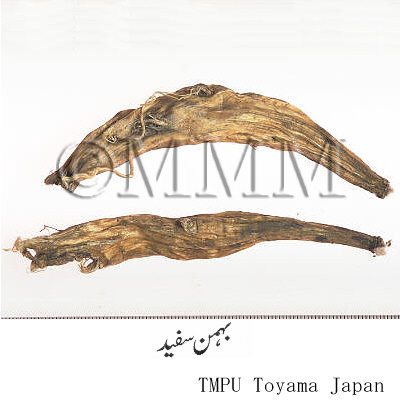Crude drug sample data base
※Click on the image to enlarge it.
The capital city, provincial capital city or the representative
location of its administrative area is indicated.
location of its administrative area is indicated.
Production area information
https://ethmed.toyama-wakan.net/img/pin_san.png
25.0700428
67.2847875
Collection information
Islamic Republic of Pakistan,Karachi [Karachi], Sind
https://ethmed.toyama-wakan.net/img/pin_nyu.png
Scientific information data base
| Crude drug name | Urudu name, English name | Behman safaid, White Behen | |||
|---|---|---|---|---|---|
| Arabic name / Persian name | Behman abyad / Safaid Behman | ||||
| crude drug image |
| ||||
| Original plant name | Centaurea behen Linn. | ||||
| Family name | Compositae | ||||
| Used part | Root | ||||
| Distribution area | Behen is of two kinds: (a) Red and (b) white. Here red and white behens are described together. Red behen, Salvia haematodes, is found throughout India, while white behen, Centaurea behen is a native of Persia . Both are procured from Armenia and Khurasan. | ||||
| Description | The roots of white behen look like dried carrots of small size, look crooked, twisted, having wrinkles on the outer surface. The white behen is whitish internally and externally. White behen is less hot than red behen. Odour - agreeable; taste - astringent, mucilaginous. | ||||
| Function and properties | Heart, Sexual organs. Exhilarant and cardiac tonic, aphrodisiac, antiflatulent, semenagogue, fattening, astringent, refining and deobstruent. | ||||
| Specific actions | Aphrodisiac and tonic for body. | ||||
| Frequency in use | Very common in India (red behen). Not found in India (white behen). | ||||
| Common uses | Bahman is a strong tonic for the heart and is useful in palpitation and weakness of the heart. It fattens the body. It also strengthens the sex organs. It increases the formation of semen. Its powder is taken with milk alone or with other suitable ingredients. It relieves sexual debility. Regarded as useful resolvent of excess phlegmatic humours. | ||||
| Side effect | Large dose or prolonged duration use described as harmful for individuals with hot temperament. | ||||
| Medical system | Unani | ||||
| Traditional concept | Temperament | It is hot and dry in the second degree. | |||
| Drug effect | Aphrodisiac and tonic for body. | ||||
| Dosage | 5 to 7 gm. | ||||
| Substitute | Red variety (red behen) substitutes white variety and vice versa. Also Musli (Curcilago orchioides Gaertn.) and Todari (Cheiranthus cheiri Linn.). | ||||
| Related drugs | Similar for each other white and red behen. | ||||
| Corrigent (corrective) | Ziziphus jujuba Mill. and Cochlospermum religiosum (L.) Alston. | ||||
| Important compound preparations | Habb Jadwa, Khamira Gaozaban, Dawa al Misk Mo`tadil Sadah, Labub kabir and Ma`jun Shir Bargadh wali. | ||||
| References | Reference book Tips! | Glossary of Indian Medicinal Plants, 1956. Chopra, R.N., Nayar, S.L. and Chopra, I.C., Council of Scientific & Industrial Research, New Delhi. - New Edition (1996) National Institute Science Communication; Supplement pp 57-58. Avicenna's Tract on Cardiac Drugs and Essays on Arab Cardiotherapy, 1983. Hameed, H. A. Hamdard Foundation Press, Karachi. p 44. Makhzanul-Mufradat (Khawasul Adviyah), Hakeem Kabiruddin, Daftar Al-Masih, Qarol Bagh, Delhi. p 141. Al-Qanun Fil-Tibb. Avicenna. (English translation of the critical Arabic text), Book 2, 1998. Hameed, H. A. (editor), Dept. of Islamic Studies, Jamia Hamdard (Hamdard University), New Delhi. p 117. Al-Jamili Mufradt Al Adwiya Wal Aghziya (1197-1248 A.D.). Ibn al-Baytar. Vols. 1-3, 1985-1999. Central council for Research in Unani Medicine, Janakpuri, New Delhi. pp 304-305. Hamdard Pharmcopoeia of Eastern medicine, 1969. Said, H. M. (editor), The Times Press, Sadar Karachi. pp 98, 122, 130-131, 244, 276. Indusyunic Medicine, 1997. Usmanghani, K., Saeed, A. and Alam, M. T. Department of Pharmacognosy, Faculty of Pharmacy, University of Karachi, Karachi. pp 151-152. | |||
| Remarks | Avicenna (Ibn Sina) has included white behen among sixty-three drugs for cardiac ailments in ''al-adwiyat al-Qalbia'' (Cardiac Drugs). According to Razi, the red behen is more hot and stimulates the sexual power. Both produce tenuity and remove obstructions. Both are counted among the drugs against gout. Red and white varieties have been described together by Unani physicians as Bahmanain (the two behmans). Rhazes, Avicenna (Ibn Sina), Ibn al-Baytar and Kabiruddin have described these drugs to relieve sexual debility and as tonic for body. Both of them have properties to strengthen the heart and exhilarate it at the same time. The properties (astringent and demulcent) are being helpful to it (Avicenna). | ||||
| Last renewal date | 2024/12/02 | ||||




